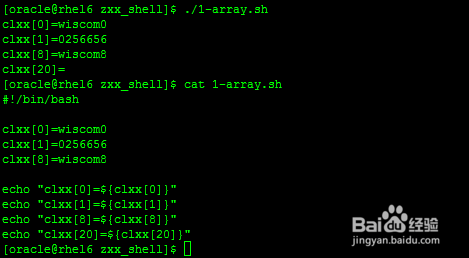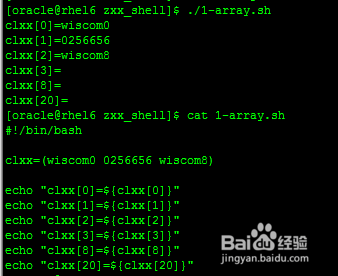shell之 数组(Array)
1、1、bash shell脚本执行权限
[root@rhel6 ~]# mkdir /zxx_shell
[root@rhel6 ~]# chown -R oracle:oinstall /zxx_shell/
[root@rhel6 ~]# su - oracle
[oracle@rhel6 ~]$ cd /zxx_shell/
[oracle@rhel6 zxx_shell]$ vi 1-array.sh
[oracle@rhel6 zxx_shell]$ ll
总用量 4
-rw-r--r--. 1 oracle oinstall 168 8月 4 17:00 1-array.sh
[oracle@rhel6 zxx_shell]$ chmod +x *
[oracle@rhel6 zxx_shell]$ ll
总用量 4
-rwxr-xr-x. 1 oracle oinstall 168 8月 4 17:00 1-array.sh
shell脚本需要执行权限

2、2、数组赋值和获取数组值
[oracle@rhel6 zxx_shell]$ cat 1-array.sh
#!/bin/bash
clxx[0]=wiscom0
clxx[1]=0256656
clxx[8]=wiscom8
echo "clxx[0]=${clxx[0]}"
echo "clxx[1]=${clxx[1]}"
echo "clxx[8]=${clxx[8]}"
echo "clxx[20]=${clxx[20]}"
[oracle@rhel6 zxx_shell]$ ./1-array.sh
clxx[0]=wiscom0
clxx[1]=0256656
clxx[8]=wiscom8
clxx[20]=
允许数组空缺元素,也可以不连续的给数组赋值。

3、3、圆括号对数组赋值
[oracle@rhel6 zxx_shell]$ cat 1-array.sh
#!/bin/bash
clxx=(wiscom0 0256656 wiscom8)
echo "clxx[0]=${clxx[0]}"
echo "clxx[1]=${clxx[1]}"
echo "clxx[2]=${clxx[2]}"
echo "clxx[3]=${clxx[3]}"
echo "clxx[8]=${clxx[8]}"
echo "clxx[20]=${clxx[20]}"
[oracle@rhel6 zxx_shell]$ ./1-array.sh
clxx[0]=wiscom0
clxx[1]=0256656
clxx[2]=wiscom8
clxx[3]=
clxx[8]=
clxx[20]=
圆括号默认从0开始,默认以空格为分隔符。

4、4、圆括号赋值且指定元素值
[oracle@rhel6 zxx_shell]$ cat 1-array.sh
#!/bin/bash
clxx=(wiscom0 [3]=0256656 wiscom8)
echo "clxx[0]=${clxx[0]}"
echo "clxx[1]=${clxx[1]}"
echo "clxx[2]=${clxx[2]}"
echo "clxx[3]=${clxx[3]}"
echo "clxx[4]=${clxx[4]}"
echo "clxx[8]=${clxx[8]}"
echo "clxx[20]=${clxx[20]}"
[oracle@rhel6 zxx_shell]$ ./1-array.sh
clxx[0]=wiscom0
clxx[1]=
clxx[2]=
clxx[3]=0256656
clxx[4]=wiscom8
clxx[8]=
clxx[20]=
可以元素位置从指定元素重新计算,如果指定元素之后值没有指定元素
[oracle@rhel6 zxx_shell]$ cat 1-array.sh
#!/bin/bash
clxx=([8]=wiscom0 [3]=0256656 [0]=wiscom8)
echo "clxx[0]=${clxx[0]}"
echo "clxx[1]=${clxx[1]}"
echo "clxx[2]=${clxx[2]}"
echo "clxx[3]=${clxx[3]}"
echo "clxx[4]=${clxx[4]}"
echo "clxx[8]=${clxx[8]}"
echo "clxx[20]=${clxx[20]}"
[oracle@rhel6 zxx_shell]$ ./1-array.sh
clxx[0]=wiscom8
clxx[1]=
clxx[2]=
clxx[3]=0256656
clxx[4]=
clxx[8]=wiscom0
clxx[20]=

5、5、@和*表示数组元素
[oracle@rhel6 zxx_shell]$ cat 1-array.sh
#!/bin/bash
clxx=([8]=wiscom0 [3]=0256656 [0]=wiscom8)
echo "clxx[@]=${clxx[@]}"
echo "----------------"
echo "clxx[*]=${clxx[*]}"
[oracle@rhel6 zxx_shell]$ ./1-array.sh
clxx[@]=wiscom8 0256656 wiscom0
----------------
clxx[*]=wiscom8 0256656 wiscom0
@和*表示数组元素表示数组所有元素。
[oracle@rhel6 zxx_shell]$ cat 1-array.sh
#!/bin/bash
clxx=([8]=wiscom0 [3]=0256656 [0]=wiscom8)
for i in ${clxx[@]}
do
echo $i
done
[oracle@rhel6 zxx_shell]$ ./1-array.sh
wiscom8
0256656
wiscom0
打印时只输出赋值的元素。

6、6、@和*加引号打印区别
注意:当使用引号时,@和*打印有区别
[oracle@rhel6 zxx_shell]$ cat 1-array.sh
#!/bin/bash
clxx=([8]=wiscom0 [3]=0256656 [0]=wiscom8)
for i in "${clxx[@]}"
do
echo $i
done
[oracle@rhel6 zxx_shell]$ ./1-array.sh
wiscom8
0256656
wiscom0
[oracle@rhel6 zxx_shell]$ vi 1-array.sh
[oracle@rhel6 zxx_shell]$ cat 1-array.sh
#!/bin/bash
clxx=([8]=wiscom0 [3]=0256656 [0]=wiscom8)
for i in "${clxx[*]}"
do
echo $i
done
[oracle@rhel6 zxx_shell]$ ./1-array.sh
wiscom8 0256656 wiscom0

1、1、抽取、删除和替换 数组元素中的子串
[oracle@rhel6 zxx_shell]$ cat 1-array.sh
#!/bin/bash
clxx=(wsscom0 0256656 wiscom888 ednns)
echo "extracting substring"
echo ${clxx[*]:0} #表示从第一个元素开始抽取
echo ${clxx[*]:1} #表示从第二个元素开始抽取
echo ${clxx[*]:3}
echo ${clxx[*]:0:1} #表示从第一个元素开始抽取2个元素
echo "removing substring"
echo ${clxx[*]#w*s} #表示删除元素中匹配w*s的子串
echo "replacing substring"
echo ${clxx[*]/w*s/zxx} #表示第一次全部将元素中匹配w*s的子串替换为"zxx"子串
echo ${clxx[*]//s*c/cs}
#表示全部将元素中匹配s*c的子串替换为"cs"子串,如果第一次替换之后又符合“s*c”又进行替换,直到没有为止
[oracle@rhel6 zxx_shell]$ ./1-array.sh
extracting substring
wsscom0 0256656 wiscom888 ednns
0256656 wiscom888 ednns
ednns
wsscom0
removing substring
scom0 0256656 com888 ednns
replacing substring
zxxcom0 0256656 zxxcom888 ednns
wcsom0 0256656 wicsom888 ednns

2、2、声明数组、清空数组、求取数组长度
[oracle@rhel6 zxx_shell]$ cat 1-array.sh
#!/bin/bash
declare -a clxx #声明clxx为一个数组
echo "input company by a SPACE" #元素之间需要用空格隔离
read -a clxx #将键盘输入的值赋值给clxx数组
for i in $ "${clxx[*]}"
do
echo "$i"
done
echo "the length of this array clxx is:${#clxx[*]}" #获取数组长度
unset clxx[1] #清除clxx[1]元素
echo "the length of this array clxx is:${#clxx[*]}"
unset clxx #清除clxx整个数组
echo "the length of this array clxx is:${#clxx[*]}"
[oracle@rhel6 zxx_shell]$ ./1-array.sh
input company by a SPACE
wiscom ednns zxx wisedu
$
wiscom ednns zxx wisedu
the length of this array clxx is:4
the length of this array clxx is:3
the length of this array clxx is:0
[oracle@rhel6 zxx_shell]$ vi 1-array.sh
[oracle@rhel6 zxx_shell]$ ./1-array.sh
input company by a SPACE
wiscom ednns zxx wisedu
$
wiscom ednns zxx wisedu
the length of this array clxx is:4
the length of this array clxx is:3
the length of this array clxx is:0

3、3、数组与数组连接
[oracle@rhel6 zxx_shell]$ cat 1-array.sh
#!/bin/bash
compony=(wiscom wisvision wisedu)
person=(zxx [7]=wl yxz)
declare -a combine #声明combine为数组
combine=(${compony[*]} ${person[*]}) #连接两个数组组成combine数组
element_count=${#combine[*]}
index=0
while [ "$index" -lt "$element_count" ] #while循环遍历
do
echo "element[$index]=${combine[$index]}"
let "index=$index+1"
done
echo
unset combine #清空数组
combine[0]=${compony[*]}
combine[1]=${person[*]}
element_count=${#combine[*]}
index=0
while [ "$index" -lt "$element_count" ]
do
echo "element[$index]=${combine[$index]}"
let "index=$index+1"
done
[oracle@rhel6 zxx_shell]$ ./1-array.sh
element[0]=wiscom
element[1]=wisvision
element[2]=wisedu
element[3]=zxx
element[4]=wl
element[5]=yxz
element[0]=wiscom wisvision wisedu
element[1]=zxx wl yxz
第一种连接会将子数组中的不连接元素按顺序重新赋值给连接数组
第二种连接直接输类似赋值

1、1、实现堆栈
[oracle@rhel6 zxx_shell]$ cat 1-array.sh
#!/bin/bash
maxtop=50 #堆栈放入最大元素
top=$maxtop #定义栈顶指针,初始值为maxtop
temp= #定义临时全局变量,存放出栈元素
declare -a stack #定义一个全局数组stack
push()
{
if [ -z "$1" ] #如果第一参数为空,退出push函数
then
return
fi
until [ $# -eq 0 ] #如果参数个数为0退出
do
let top=top-1
stack[$top]=$1
shift #将后面参数逐个覆盖前面参数
done
return
}
#push是将第一个参数赋值给stack[49],第二个参数赋值给stack[48],依次循环
pop()
{
temp=
if [ "$top" -eq "$maxtop" ] #如果堆栈为空退出pop
then
return
fi
temp=${stack[$top]} #将栈顶赋值给temp
unset stack[$top]
let top=top+1
return
}
#pop是将栈顶赋值给temp,然后清空栈顶
status()
{
echo "===============stack===================="
for i in ${stack[*]}
do
echo $i
done
echo "------------------------------------"
echo "stack pointer=$top"
echo "just popped \""$temp"\" off the stack"
echo "=========================================="
}
push wiscom
status
push ednns wisvision wisedu
status
pop
pop
status
push zxx
push zxx kkk
status
[oracle@rhel6 zxx_shell]$ ./1-array.sh
===============stack====================
wiscom
------------------------------------
stack pointer=49
just popped "" off the stack
==========================================
===============stack====================
wisedu
wisvision
ednns
wiscom
------------------------------------
stack pointer=46
just popped "" off the stack
==========================================
===============stack====================
ednns
wiscom
------------------------------------
stack pointer=48
just popped "wisvision" off the stack
==========================================
===============stack====================
kkk
zxx
zxx
ednns
wiscom
------------------------------------
stack pointer=45
just popped "wisvision" off the stack
==========================================
第一个参数为: $1 参数个数为: $#
shift原来的$2会变成$1

2、2、实现二维数组